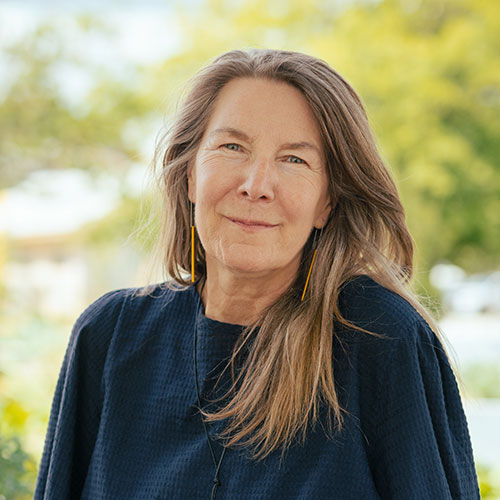Thanks to the support of a generous philanthropist, Pam McDougall, this complex conversation has begun.
The inaugural Pam McDougall Lecture, the first in a series of public lectures on early childhood education, provided thought-provoking insights into the complex issue of climate change and early years education.
Delivered by Education Professor Iris Duhn, the University of Tasmania’s lead for the Early Years Living Lab, the lecture explores a child and place based approach to climate education in the early years.
Professor Duhn from the Faculty of Education in the College of Arts, Law and Education said research indicates that even very young children can understand climate events, which has the potential to create anxiety and fear.
The University’s new Early Years Living Lab aims to develop a new model for climate change education and help children build a foundation for climate change resilience and agency.
Professor Duhn said Pam’s generous support had provided an invaluable opportunity for research and engagement on a topic of the utmost importance not just for our children, but for our species.
Pam’s interest in supporting research and engagement in early childhood education sprang from her own career as an educator.
In the 1950s, early childhood education for the pre-school years was not available in Tasmania, so Pam travelled to Victoria to complete her studies, before returning to the island to start her career.
Pam believes early childhood education is crucial to building the foundations for a child’s health and wellbeing.
“Children need a well-planned environment with teacher support as they learn about the world and their place in it,” Pam said.
She notes that Professor Duhn gave an example in her lecture of children experiencing the same disaster in very different ways.
“In such situations, the early childhood teacher plays an important role by providing for young students with diverse understandings.”
Pam’s generous gift will support the University’s mission to increase educational attainment in Tasmania. One of the ways this can be achieved is by focusing on enhancing and evolving early childhood education.
“I hope that my gift will encourage others to consider supporting research into early childhood education,” Pam said.
The McDougall family have made their own significant contribution to education over many years through their strong connection with the University of Tasmania stretching back more than a century.
Pam’s husband, the late Emeritus Professor Ian McDougall, graduated in 1956 with honours in Geology and Chemistry. It formed the bedrock of his distinguished career, which included becoming Professor of Research at the School of Earth Sciences in 1991. He was appointed Emeritus Professor in 2001.
His grandfather, Emeritus Professor Dugald Gordon McDougall, was appointed as the Professor of Law and Modern History at the University of Tasmania in 1901.
For more than three decades Professor DG McDougall was Tasmania’s only full-time law academic, training many of the State’s lawyers, barristers, judges and magistrates.
Professor Ian McDougall’s uncle Archibald also studied a Bachelor of Arts at the University and he was awarded a Rhodes Scholarship.
Professor Ian McDougall may not have followed in the family footsteps by studying law, but instead opted for a stellar career in the sciences.
He spent most of his career at Australia National University (ANU) focused on radiometric dating of rocks using the natural processes, establishing centres of excellence and dating fossil material from central Africa.
The apogee of his career was being awarded a Doctor of Science (DSc), the highest academic honour from the University of Glasgow in 2009.
When he died, Pam honoured his memory, career and passion for geology by establishing the Ian McDougall Memorial Scholarship in Geology.
Four generations of McDougalls have studied at the University of Tasmania strengthening the family’s academic lineage and making contributions to professions ranging from: education, business, music, medicine, nursing, law and science.
Professor Duhn thanked Pam for supporting early childhood education research, which the Early Years Living Lab was at the forefront of investigating.
Its innovative approach will involve strengthening children’s sense of belonging to place and to the planet, and working with children to shape their own futures.
The lab will explore the possibilities for young children to learn to live with climate change in creative and adaptive ways.
Main image: Professor Iris Dunn
Read more stories from Impact 2022.



